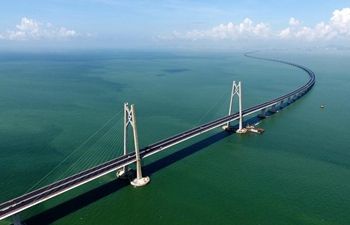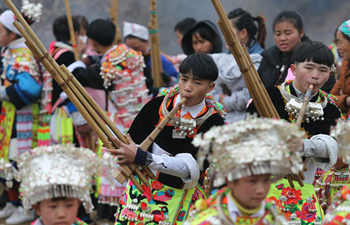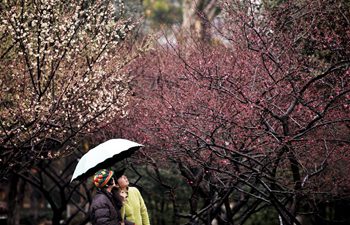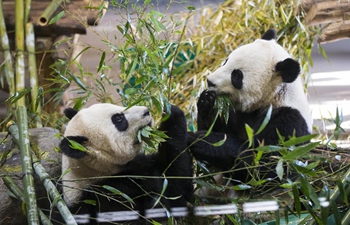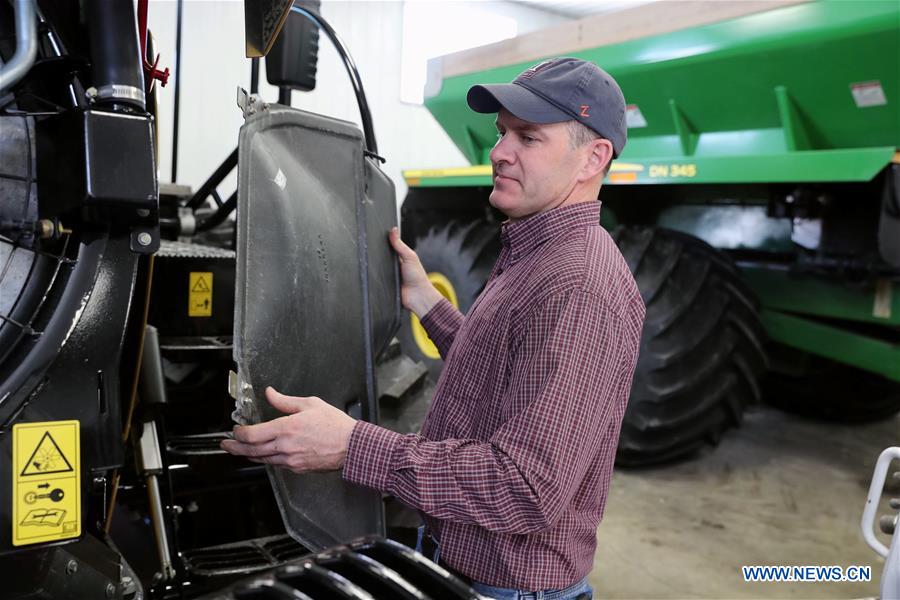 ?
?Bob Stewart, who runs the Stewart Farms Partnership, does winter maintenance on farm machinery at a garage in Yorkville, Illinois, the United States on Feb. 12, 2018. For the Stewart family who has farmed for three generations on this vast stretch of farmland in the northeastern part of Illinois in the United States, farming is an important career rather than just livelihood and trade disputes with China need to be avoided for the prospect of agricultural exports. (Xinhua/Wang Ping)
By Xinhua writers Xu Jing, Miao Zhuang and Wang Ping
CHICAGO, Feb. 25 (Xinhua) -- For the Stewart family who has farmed for three generations on this vast stretch of farmland in the northeastern part of Illinois in the United States, farming is an important career rather than just livelihood and trade disputes with China need to be avoided for the prospect of agricultural exports.
The family moved to Yorkville in the 1940s, about 80 kilometers southwest of Chicago, and has be devoted to farming ever since. Today, the Stewart Farms Partnership operates about 9,000 acres of farmland in northern and central Illinois.
Bob and Brad Stewart, the third-generation members of the family, now run the farm, supervised by their father Craig Stewart, who has more than 40 years of farming experience.
On a snowy day in February, Bob and Brad were busy doing winter maintenance on farm machinery in the workshop. Farming has kept the brothers fit and energetic. They took off the side board of a tractor and screwed it back on after attentively examining every piece of the interior layout.
Different from their parents and grandparents, the Stewart brothers has received college education. After graduating with a bachelor's degree and a master's degree both in agricultural economics from the University of Illinois, he had worked for Centrec Consulting for 10 years before coming back to the farm.
Brad received a bachelor's degree in agricultural economics from the University of Illinois, and worked in the area of logistics management in a Wal-Mart distribution center before returning to the farm.
"I guess when you are raised around it, it is something that is always in your blood. When you go out, you work outside of the farm, and that something can always draw you back to it," said Brad.
"When I grew up, I never thought I was going to be a full-time farmer. But after you get away from it, it is something that pulls you back to it. You don't realize that freedom you have growing on a farm until you get away from it and it pulls you back to it," he added.
Challenges farming brings are what the brothers need to face. Today, farming is far from just about manual labor but a combination of technology, science, computing, planning and logistics.
"Farming is one of the most rewarding careers I could think of. It's challenging and rewarding all the same," said Brad.
Bod hopes the next generation of the family will continue to engage in agriculture. "I am proud to be an American farmer," he said.
Though the brothers have limited knowledge of China, since Bob had never been to China and Brad has stayed in Beijing for only four days in 2012, their daily life is closely tied to the Chinese market.
Statistics of Illinois Soybean Association show that Illinois farmers produced a total of 611.9 million bushels of soybeans in 2017, and China, a top location of Illinois soybean exports, received about 1.1 billion bushels, over 63 percent of all Illinois soybean exports.
Illinois is the largest soybean producing state in the United States, and roughly exports 60 percent of its soybean production.
Since 2013 when China became the biggest export destination for Illinois, the state's agricultural exports to China averaged 1.85 billion dollars per year, or an annual market share average of 25 percent of all Illinois agricultural exports.
Recent trade friction between China and the U.S. has caused worry among U.S. farmers. If any trade war happens, "it would hurt us," said Brad.
"They (trade disputes) would increase the price and hurt the demand, so I can make speculations that price will go down. It would impact us, impact our profitability, and soybean prices would drop .... It could be significant," said Bob.
Tom Watkins, former president and chief executive officer of Michigan Economic Council who has studied China for more than 30 years, quoted an African proverb -- "When elephants fight, it is the grass that suffers."
"A trade war between our two countries would be unproductive and hurt the Chinese and American people and needs to be avoided at all costs," he told Xinhua.
?







